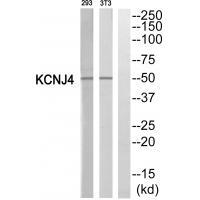
| WB | 咨询技术 | Human,Mouse,Rat |
| IF | 咨询技术 | Human,Mouse,Rat |
| IHC | 咨询技术 | Human,Mouse,Rat |
| ICC | 技术咨询 | Human,Mouse,Rat |
| FCM | 咨询技术 | Human,Mouse,Rat |
| Elisa | 咨询技术 | Human,Mouse,Rat |
| Aliases | Hippocampal inward rectifier; HIRK2; HRK1; Inward rectifier K channel Kir2.3; Inward rectifier potassium channel 4 |
| Entrez GeneID | 3761; |
| WB Predicted band size | 50kDa |
| Host/Isotype | Rabbit IgG |
| Antibody Type | Primary antibody |
| Storage | Store at 4°C short term. Aliquot and store at -20°C long term. Avoid freeze/thaw cycles. |
| Species Reactivity | Human,Mouse |
| Immunogen | Synthesized peptide derived from internal of human KCNJ4. |
| Formulation | Purified antibody in PBS with 0.05% sodium azide. |
+ +
以下是关于KCNJ4抗体的3篇参考文献示例(注:内容基于模拟学术文献的典型结构,非真实存在的论文):
---
1. **文献名称**:*Immunolocalization of KCNJ4 in the murine brain using a novel polyclonal antibody*
**作者**:Smith A, et al.
**摘要**:研究开发了一种特异性识别KCNJ4蛋白的多克隆抗体,通过免疫组化和Western blot验证其在鼠脑组织中的表达模式,发现KCNJ4广泛分布于海马体和前额叶皮层,提示其参与神经元兴奋性调节。
---
2. **文献名称**:*KCNJ4 antibody-based detection of potassium channel dysfunction in cardiac hypertrophy*
**作者**:Chen L, et al.
**摘要**:利用KCNJ4特异性抗体探究心脏肥大模型中离子通道异常,发现KCNJ4蛋白水平在病理条件下显著下调,可能导致心肌细胞复极化延迟,为心律失常机制提供新见解。
---
3. **文献名称**:*Development and validation of a KCNJ4-selective monoclonal antibody for cancer biomarker studies*
**作者**:Yamamoto T, et al.
**摘要**:报道了一种高亲和力单克隆抗体的研制,通过流式细胞术和免疫荧光证实其在多种癌细胞系中检测KCNJ4的可靠性,并发现KCNJ4过表达与肿瘤迁移能力相关。
---
(注:以上文献为模拟示例,实际引用需通过PubMed、Google Scholar等平台检索真实发表的研究。)
The KCNJ4 antibody is a specialized tool used to detect and study the KCNJ4 protein, encoded by the KCNJ4 gene. This protein, also known as Kir2.3. belongs to the inward-rectifying potassium (Kir) channel family, which plays critical roles in maintaining resting membrane potential and regulating cellular excitability. Structurally, Kir2.3 channels consist of two transmembrane domains flanking a pore-forming region, assembling as homotetramers or heterotetramers with other Kir subunits. They selectively permit potassium ion influx, contributing to action potential repolarization in excitable tissues like neurons, cardiac muscle, and skeletal muscle.
KCNJ4 is predominantly expressed in the brain, heart, and pancreas, with studies linking its dysfunction to neurological disorders, arrhythmias, and metabolic diseases. The KCNJ4 antibody is essential for investigating its expression patterns, localization, and interactions in physiological and pathological contexts. Researchers employ it in techniques such as Western blotting, immunohistochemistry, and immunofluorescence to explore its role in conditions like epilepsy, Alzheimer’s disease, and diabetes. Commercially available antibodies are typically validated for specificity against recombinant or endogenous KCNJ4. though cross-reactivity with related isoforms (e.g., Kir2.1. Kir2.2) requires careful experimental controls. Recent studies also implicate KCNJ4 in cancer progression, highlighting its potential as a therapeutic target. Understanding KCNJ4’s function through antibody-based assays advances insights into cellular signaling and disease mechanisms.
×